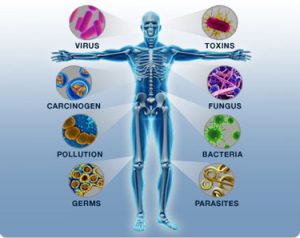Immune System
The role of the immune system — a collection of structures and processes within the body — is to protect against disease or other potentially damaging foreign bodies. When functioning properly, the immune system identifies a variety of threats, including viruses, bacteria and parasites, and distinguishes them from the body’s own healthy tissue, according to Merck Manuals.
The major components of the immune system include:
Lymph nodes:
Small, bean-shaped structures that produce and store cells that fight infection and disease and are part of the lymphatic system — which consists of bone marrow, spleen, thymus and lymph nodes, according to “A Practical Guide To Clinical Medicine” from the University of California San Diego (UCSD). Lymph nodes also contain lymph, the clear fluid that carries those cells to different parts of the body. When the body is fighting infection, lymph nodes can become enlarged and feel sore.
Spleen:
The largest lymphatic organ in the body, which is on your left side, under your ribs and above your stomach, contains white blood cells that fight infection or disease. According to the National Institutes of Health (NIH), the spleen also helps control the amount of blood in the body and disposes of old or damaged blood cells.
Bone marrow:
The yellow tissue in the center of the bones produces white blood cells. This spongy tissue inside some bones, such as the hip and thigh bones, contains immature cells, called stem cells, according to the NIH. Stem cells, especially embryonic stem cells, which are derived from eggs fertilized in vitro (outside of the body), are prized for their flexibility in being able to morph into any human cell.
Lymphocytes:
These small white blood cells play a large role in defending the body against disease, according to the Mayo Clinic. The two types of lymphocytes are B-cells, which make antibodies that attack bacteria and toxins, and T-cells, which help destroy infected or cancerous cells. Killer T-cells are a subgroup of T-cells that kill cells that are infected with viruses and other pathogens or are otherwise damaged. Helper T-cells help determine which immune responses the body makes to a particular pathogen.
Thymus:
This small organ is where T-cells mature. This often-overlooked part of the immune system, which is situated beneath the breastbone (and is shaped like a thyme leaf, hence the name), can trigger or maintain the production of antibodies that can result in muscle weakness, the Mayo Clinic said. Interestingly, the thymus is somewhat large in infants, grows until puberty, then starts to slowly shrink and become replaced by fat with age, according to the National Institute of Neurological Disorders and Stroke.
Leukocytes:
These disease-fighting white blood cells identify and eliminate pathogens and are the second arm of the innate immune system. A high white blood cell count is referred to as leukocytosis, according to the Mayo Clinic. The innate leukocytes include phagocytes (macrophages, neutrophils and dendritic cells), mast cells, eosinophils and basophils.
Disorders of the immune system
- Lupus
- Allergies
- Inflammatory diseases
- Cancer
- Scleroderma
- Certain types of hemolytic anemia
- Vasculitis
- Type I diabetes
- Graves disease
- Rheumatoid arthritis
- Multiple sclerosis (although it is thought to be an immune-mediated process)
- Goodpasture’s syndrome
- Pernicious anemia
- Some types of myopathy
- Lyme disease (Late)
The Olive Leaf partners with your current primary care physician or will refer you to someone if you are not currently under care of a PCP. The Olive Leaf does not treat diseases associated with your immune system but we do provide predictive measures to stay on top of your Immune System from a preventative perspective.
Services
- Supplement recommendations
- TK1 testing
- Thermography
- PH balancing
- Toxic element testing through Genova
- Detoxification
- Genetic testing
- Nutrient deficiency testing
- Targeted Immune enhancing nutritional programs
- Environmental evaluation to help decrease toxic exposure.
- Estronex testing to see how your liver is processing negative estrogens through Genova
- BPA or Paraben accumulation testing through Genova
- Supportive supplement, nutritional recommendations for mercury removal
- Stress Reduction Techniques through The ARC program
- Self healing program through SELF ReClaimedTM
- Food/chemical/mold sensitivity
- GI testing


